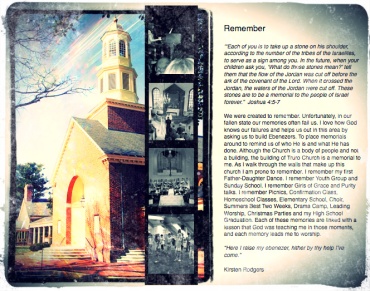When I was growing up I spent more time at church than anywhere else. One of the things my friends and I loved to do was play Wallball against the main edifice of the church. One of the great things about that was a ridge that ran across the wall about a yard above the ground. Hitting that lip just right could send the ball sailing over everyone’s head. A friend’s mother recently asked me to write up the rules of the game for younger generations to continue the game.
Wallball Rules:
Equipment: tennis ball or other rubber bouncing ball approximately the size of a baseball; wall
Numbers: 2-infinity, but I’d recommend something less than 10
The object of the game is to be the last man standing. Generally, you mirror baseball’s rules, with three outs before you sit and tie goes to the runner.
General concept: free for all throwing the ball against the wall and fielding the ricochets. There are no turns – if you want the ball, field the ball.
The ball MUST be thrown toward the wall.
If a ball is thrown against the wall and caught on the fly (by the thrower or another player), the thrower is out.
If a fielding error occurs, the player who erred must touch the wall before another player can field it cleanly and throw the ball to the wall. If the ball beats the runner, that is an out.
In wall ball, error is used broadly to mean having the ball touch the ground after you have touched it. A ball that rolls as you try to pick it up is an error. You can’t dribble the ball, but you can toss it up in the air and catch it.
However, a ball that bounces off you and is fielded on the fly by another player would not constitute an error. But if that other player doesn’t field it cleanly but drops it, both players would need to touch the wall.
Throwing Errors:
There are two philosophies on throwing errors. The first and most straightforward is that to not hit the wall on the fly is an out. That means a bounced ball, blocked throw, or clean miss is an out.
The other philosophy is that to miss the wall constitutes a normal error. One could miss the wall and yet avoid the out by touching the wall before the ball can be fielded and thrown against the wall. Obviously in this case a bounced throw would beat the thrower to the wall.
Butterfly
Often a younger player’s favorite aspect of the game, “Butterfly” maybe yelled once another player has grabbed the ball to force them to throw from that spot. To be called in general play is obnoxious (hence a younger player’s favorite part) but a key facet when the ball is fielded in an unfavorable location, i.e. far from the wall, behind a tree, behind or nearly parallel with the plane of the wall.
In situations where the ball is in an unfavorable location, the person closest must go get it.
For the attentive and competitive, there is Butterfly Bending Over. If this is called as soon as the player grabs the ball and is still bent over, they must make the throw from that position. If they have stood up before this is called, they don’t have to be bent over, but they must still throw from there.
The very cynical player would probably just throw the ball in the other direction, but so the clause was instated that the ball must be thrown towards the wall. The slightly less cynical player often drops the ball in these situations, taking the error and tries to beat the throw to the wall.
Situational Rules:
You may block other people’s throws. Depending on the rules you follow in terms of throwing errors (above), merely catching someone’s throw before it hits the wall may or may not constitute an out.
If your throw ricochets off the wall and is in danger of being caught, you may try to block the catch. The cynical jackwad would swat it to an unfavorable location, which, while legal, is not really within the spirit of the game and will probably result in said jackwad not having friends. Contact is permissible, but nothing flagrant is within the spirit of the game; the risk of losing all your friends is your own. Also, no one likes a whiner.
If you commit an error but out of reflex still field the ball, it must be dropped before running to the wall. You may not carry it to the wall, you may not throw it away, just drop it. On your way to the wall you may try to block another player’s throw, but that is usually inadvisable as it will probably slow you down.
Play ball!


